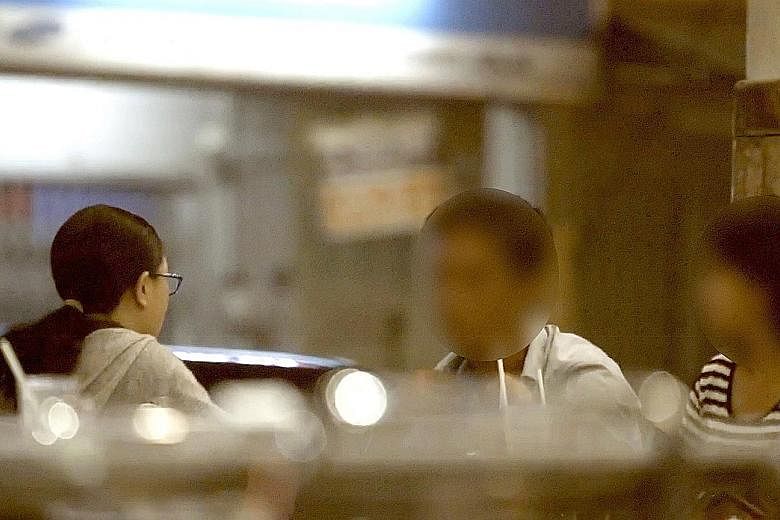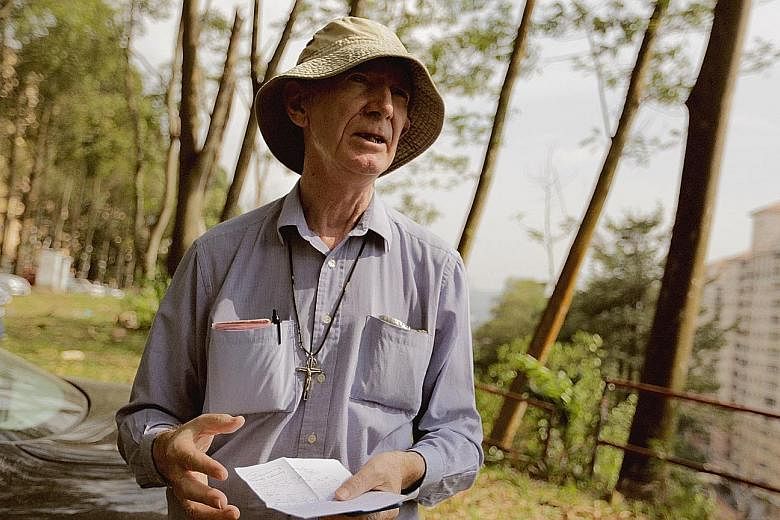In a crowded shopping mall in Kuala Lumpur, 16-year-old Shirley (not her real name) met two men she had never seen in her life. They gave her a flight ticket to Hong Kong and RM2,000 (S$660) in spending money. A friend she had met on Facebook, 15 years old at the time, had arranged the trip, telling her it was a free holiday. He had gone several times before, and even brought souvenirs back for her.
On the morning of her flight, one of the men showed up again and gave her and a fellow traveller a pair of shoes each. They were asked to wear them to Hong Kong.
Hours later, her life as she knew it was over. After arriving at Hong Kong International Airport, she was picked out for a body search, and 700g of heroin was found in the soles of the shoes.
For Shirley's parents back in Malaysia, the nightmare was only just beginning. For nearly two months, they had no idea what had happened to her.
The last time they saw Shirley, their only child, she was begging them to let her go to Hong Kong with her friends. She was only supposed to be gone for three days.
Her parents searched everywhere - the airport, the police, hospitals - and found nothing.
They couldn't eat or sleep, and yet, as owners of a small business, they had to continue working each day to survive.
And then came a phone call which gave them fear and relief in equal measure. It was from Hong Kong Correctional Services - their daughter was facing more than 20 years in prison on drug-trafficking charges.

Ever since that moment, Shirley's parents have been working frantically and desperately to prove their daughter's innocence.
But Shirley is not alone.
In the past year, nearly 30 young Malaysians - some still teenagers - have been arrested in Hong Kong for being drug mules on behalf of international syndicates; and experts say the arrest numbers are just a fraction of those who actually make it through.
With drug production in South-east Asia's infamous Golden Triangle region hitting record highs in the past year, the number of mules being recruited to transport drugs could grow even higher across Asia, and Malaysia - the region's low-cost airline hub - appears to be the perfect transit country.
Drug syndicates operating in Malaysia have been using Facebook pages and WeChat groups to devastating effect, luring impressionable young people with "paid holidays" (like the one Shirley went for) or part-time courier jobs.
-
BEHIND THE STORY
-
Drug syndicates operating out of the infamous Golden Triangle in Indochina have been flooding Asia with record levels of synthetic drugs, with Malaysia a strategic transit point - particularly for the recruitment of innocent young mules.
Undercover journalists from The Star's young investigative team R.AGE followed the trail of information left by the mules and their devastated families to track down the syndicates' recruiters, and found enough information to help Malaysian narcotics officers make several arrests, crippling at least one drug-mule network.
Their work, which included a hidden camera sting operation on a mule recruiter, helped stem the tide of Malaysian drug-mule arrests in Hong Kong - another strategic transit point for drug trafficking, according to experts. It also helped create widespread awareness about the drug-mule syndicates' recruitment strategies.
In the months after R.AGE's investigations, there were zero Malaysian mule arrests reported in Hong Kong, according to one activist, compared with more than two dozen arrested in the nine months before.
Then, in May, news of two more arrests emerged.
R.AGE is now working with the arrested mules' families to provide information that could help the mules' cases in court, and is planning a follow-up campaign to tackle drug abuse.
Some even say openly that the job involves drugs.
If the mules get arrested, they are left to rot in prison while the syndicates get off scot-free.
All communication is done using fake profiles on chat apps, so the recruiters cannot be traced.
After receiving a tip-off from a lawyer and a prison chaplain in Hong Kong, journalists from The Star's young investigative team R.AGE started looking into this increase in drug-mule activity and working with the families of the arrested mules to find out more about the syndicates.
Through investigations in Malaysia and Hong Kong alone, the journalists were able to uncover syndicates which were sending mules to Vietnam, China, South Korea, Taiwan, the Middle East, Australia, and even as far as Brazil and Peru.
The team then went undercover, posing as potential drug mules to meet the syndicates' recruiters, in the hope of exposing their tactics - which range from friendly recruitment to brutal physical force.
Little did they know that their investigations would eventually help expose a dangerous drug-trafficking network, with connections to a dealer in Hong Kong.
But it all started with a series of prison visits in Hong Kong.
Shirley, now 18, told R.AGE her story from behind a glass panel at a Hong Kong prison. She was supposed to be graduating from high school this year.
Her Facebook page is full of photos of her and her friends from school. None of them knows what happened. Only her parents and a few close relatives were clued in.
"I told her not to go," said Shirley's mother, her voice trembling as she spoke from their home, in a small town two hours south of Kuala Lumpur.
They have not moved anything in Shirley's room, the bigger of the two rooms in their home. It is also the only one with a window, so the parents offered it to her.
"She's such a sweet child - her grandmother's favourite, and popular with all her schoolmates - but she started mixing with these 'friends' on Facebook, and now they've ruined her life.
"She begged me to let her go with them. I felt bad because we never had the money to take her for a holiday overseas, but I still said 'no'. In the end, we just couldn't stop her," said her mother.
Shirley's parents, too, had never been on a plane. Despite surviving on a combined RM3,000 a month, they spent almost all their savings making two trips to see Shirley in Hong Kong, desperate to find evidence that could help her case before she is sentenced.
"I can't sleep. I can't eat. I just cry myself to sleep every night thinking about her," said her mother.
"Just one trip - her first time on a plane," said her father ruefully. "Look what it has done to us."
Shirley has not heard from the 15-year-old friend who recruited her. He was on the same trip, but on an earlier flight. As far as she knows, he is back in Malaysia, safe and sound.
Other mules tell us it is a common diversionary tactic - keep the authorities busy with one or two arrests, while the majority pass through.
"I believe I was set up," said Shirley. "I was the one to take the fall. Why else would they only plant 700g on me? That seems like a very small amount."
Proving that in court, however, seemed an almost impossible task for her parents. The syndicate had burned all traces of its involvement, and the parents did not have enough money to hire a lawyer.
Although Shirley eventually pleaded guilty to avoid trial, the group of undercover journalists' investigation behind this story put a dent in Malaysian drug syndicates' operations by exposing their mule recruitment methods.
Their work has helped raise awareness about the work of Father John Wotherspoon, a prison chaplain from Hong Kong on a mission to expose drug-mule recruiters in Malaysia before they ruin more lives.
With the help of corroborative intelligence from Father Wotherspoon and families of incarcerated drug mules, a drug lord dubbed Shanker was detained under the Special Preventive Measures by narcotics officers in February.
Three more senior figures in his syndicate were arrested as well.
However, much remains to be done. Like many others, the teenage recruiter who made Shirley a drug mule is still at large.
• This story was originally published on June 24.


